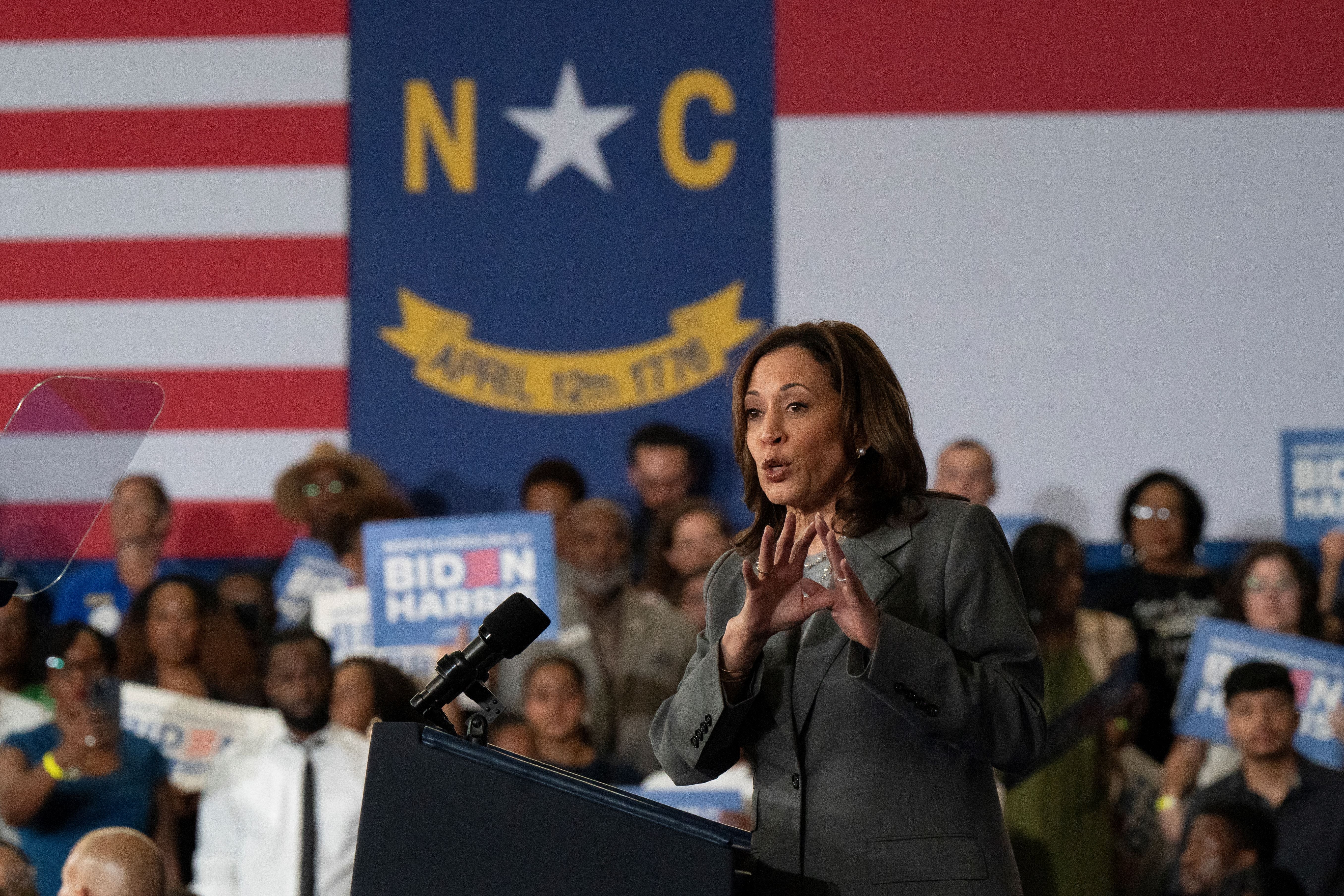How does replacing Biden actually work now that he’s dropped out of race?
The party’s nominee – who we now know will not be Joe Biden – will be officially chosen at the Democratic National Convention in Chicago between 19 and 22 August
Your support helps us to tell the story
From reproductive rights to climate change to Big Tech, The Independent is on the ground when the story is developing. Whether it's investigating the financials of Elon Musk's pro-Trump PAC or producing our latest documentary, 'The A Word', which shines a light on the American women fighting for reproductive rights, we know how important it is to parse out the facts from the messaging.
At such a critical moment in US history, we need reporters on the ground. Your donation allows us to keep sending journalists to speak to both sides of the story.
The Independent is trusted by Americans across the entire political spectrum. And unlike many other quality news outlets, we choose not to lock Americans out of our reporting and analysis with paywalls. We believe quality journalism should be available to everyone, paid for by those who can afford it.
Your support makes all the difference.Following weeks of pressure and speculation, Joe Biden announced in a letter on Sunday, July 21, that he would drop out of the race for the White House and was backing his vice president, Kamala Harris, to take his place.
Following a disastrous debate performance against Donald Trump on June 27, when he appeared confused and frail, made several gaffes, and lost his train of thought, more than 30 Democratic lawmakers publicly called for him to end his candidacy in favor of a younger candidate. Senior voices behind the scenes – like Nancy Pelosi and Chuck Schumer – were said to be encouraging him to step aside.
Insiders had previously told The Independent that they believed there was “no question” Vice President Kamala Harris would receive the baton if and when Biden chose not to run in November.
But how would replacing Biden actually work? Here’s the process:
The clock is ticking
The party’s nominee will be officially chosen at the Democratic National Convention in Chicago between 19 and 22 August.
Almost all of the nearly 4,000 Democratic delegates are currently pledged to Biden after he swept the primary races.
But during a press conference earlier this month, Biden had already said of the delegates: “They’re free to do whatever they want.”

“Tomorrow, if all of a sudden I show up at the convention and everyone says we want someone else, that’s the democratic process. It’s not going to happen.”
But it’s a bit more complicated than that. During the roll call vote to officially select the nominee, delegates who choose not to back the acknowledged candidate would have to vote “present” rather than vote for a different candidate.
Now that he has stepped aside, delegates will have to vote for someone else.
Brookings senior fellow Elaine Kamarck told CNN that the rule for electing nominees, in place since the 1984 convention, states that delegates should “in all good conscience vote for the person they were selected to represent.”
But she added: “It’s never been tested. There’s no legal history on what ‘in all good conscience’ means ... We’ve never had a convention where a lot of people voted against the person that they got elected with.”
Now Biden has stepped aside
Now that Biden is no longer a candidate, Democrats will have to pick a new presidential nominee. And the logistics surrounding that are not simple.
The modern primary campaigning and nominating process began in earnest during John F Kennedy’s 1960 run for president. Before that, nominating a candidate bore more resemblance to proverbial smoke-filled rooms where party elders selected the nominee away from the eyes and ears of the public.
That’s infeasible at this moment, particularly for a party that bills itself as a defender of democracy.
At the same time, Democrats would risk a battle royale if too many candidates were to emerge in the race.
With Biden out, the process will have to be carefully handled to make sure this didn’t scupper the party’s chances against Trump in November.
‘A process that is open, transparent, and energizing’
Enter James Zogby, member of the Democratic National Committee, who worked on Jesse Jackson’s campaigns and whom Bernie Sanders nominated to serve on the party platform committee in 2016.
Zogby recently sent a memo, seen by The Independent, to DNC Chairman Jaime Harrison laying out how to replace Biden in the event that he would step down.
“The central idea is to create a process that is open, transparent, and energizing, while, at the same time, legitimate and democratic,” the memo reads. “And it is one that is deeply respectful of the president and his accomplishments.”
The plan would require that any prospective candidate secure the endorsement of 40 committee members — since most members are elected officials — and that they must include four members from each region.

After the deadline, candidates would appear during televised events to make their case to voters. That would culminate in a nominating process at the Democratic National Convention in August.
“It is not a coronation,” the memo says. “...For at least one month, national media will be focused on our candidates and their exciting process, drawing sharp contrast with the antics of GOP nominee. Given that we can likely predict the pool of potential candidates (Vice President Harris, Governors, Senators, Members of Congress) — the debate they will have will no doubt be respectful and substantive.”
Zogby’s proposal is an audacious one. It would require TV networks to comply and broadcast the debate. And despite his optimism, there is no guarantee that the contest for delegates would be a clean fight.
Indeed, the old ways were rife with kickbacks, corruption, and back-scratching. And Republicans would make hay of the disarray that Democrats face.
But it might be one of the few options the party has. In 2020, Democratic primary voters chose Biden almost as soon as he won in South Carolina, and then, as a way to prohibit a challenger, the party moved the state up the calendar in 2024. Democrats ostracized heretics like Representative Dean Phillips who suggested something different, even if he was an admittedly imperfect messenger for his cause.
Many Democrats might now want to take a look at Zogby’s proposal.
A question of cash
There are a number of reasons that party leaders think Harris will now be handed the nomination – one of them being the campaign cash.
Biden and Harris have raised hundreds of millions of dollars over the last couple of years. The money has been divided between the Democratic National Committee, the Biden campaign, almost all state Democratic parties, as well as a number of joint fundraising committees that send cash around all those groups.
Those entities had collectively about $240m in cash in hand as of June 30. While most of the funds, such as those controlled by the Democratic National Committee, wouldn’t be affected by changing the top of the ticket, the most valuable cash is held by the Biden-Harris campaign committee, which had a $91m war chest as of May 30. Those funds have been raised by, and belong to, the Biden-Harris ticket, and which follow those two candidates.
Harris will be able to access those funds.
However, if Harris isn’t chosen as the party’s nominee, the funds would have to be refunded or, as is more likely, transferred to a federal Super PAC. But those funds would then no longer be directly controlled by the campaign.

Join our commenting forum
Join thought-provoking conversations, follow other Independent readers and see their replies
Comments